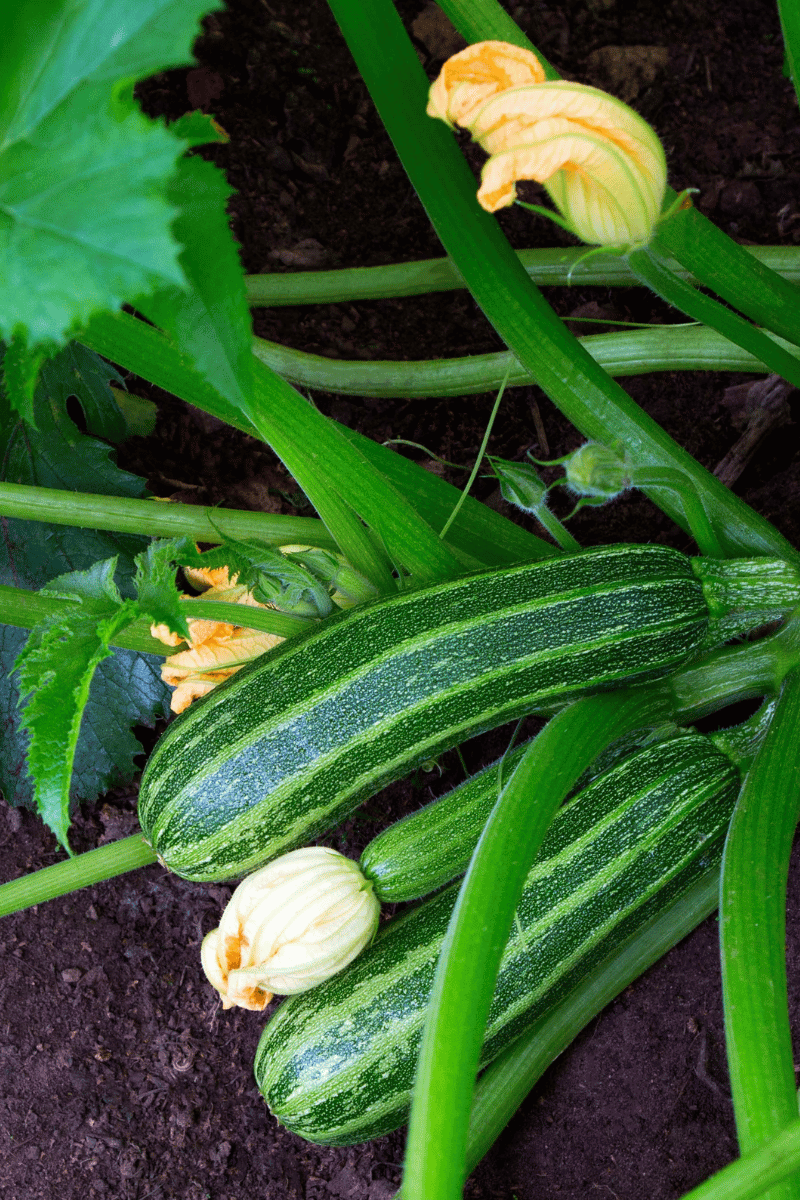Can Goats Eat Timothy Hay? What You Need to Know
If you’re wondering if goats can eat timothy hay, this post is for you. I will also go over a goat’s diet in general with goat feed type of hay available, and special health considerations such as pregnant or baby goats.
An important thing to remember is to discuss your goat’s health concerns with their vet as needed.
With goat husbandry, ensuring proper nutrition stands as a cornerstone for fostering good health and vitality. Among the many components comprising a goats’ diet, hay is a fundamental necessity.
Acting as a primary source of fiber and essential nutrients, hay plays a pivotal role in sustaining the well-being of goats throughout their lives. As conscientious goat owners, it’s imperative to understand the many different hay options available and their respective impacts on our goats’ health and performance.
When considering hay varieties you must consider that each possesses unique qualities tailored to meet the specific needs of our goats. From the rich protein content of alfalfa hay to the hearty sustenance provided by legume hay, the diversity in hay types allows goat owners to fine-tune their animals’ diets with precision.
However, amidst the many choices, timothy hay emerges as a favored selection among discerning goat keepers. Renowned for its balanced nutritional profile and compatibility with the digestive systems of goats, timothy hay has garnered acclaim as a top-tier option for fulfilling the dietary needs of our beloved livestock.
Different Types of Hay for Goats
Selecting hay for goats involves understanding a variety of great options, each with unique characteristics and nutritional profiles. When selecting your hay always try and select the high-quality option if possible. Here are some common types of hay used in goat nutrition:
Timothy Hay
Known for its balanced nutritional composition and compatibility with goats’ digestive systems. Offers moderate protein levels and high fiber content, suitable for goats of all ages.
You can even buy timothy hay online at places like Amazon.
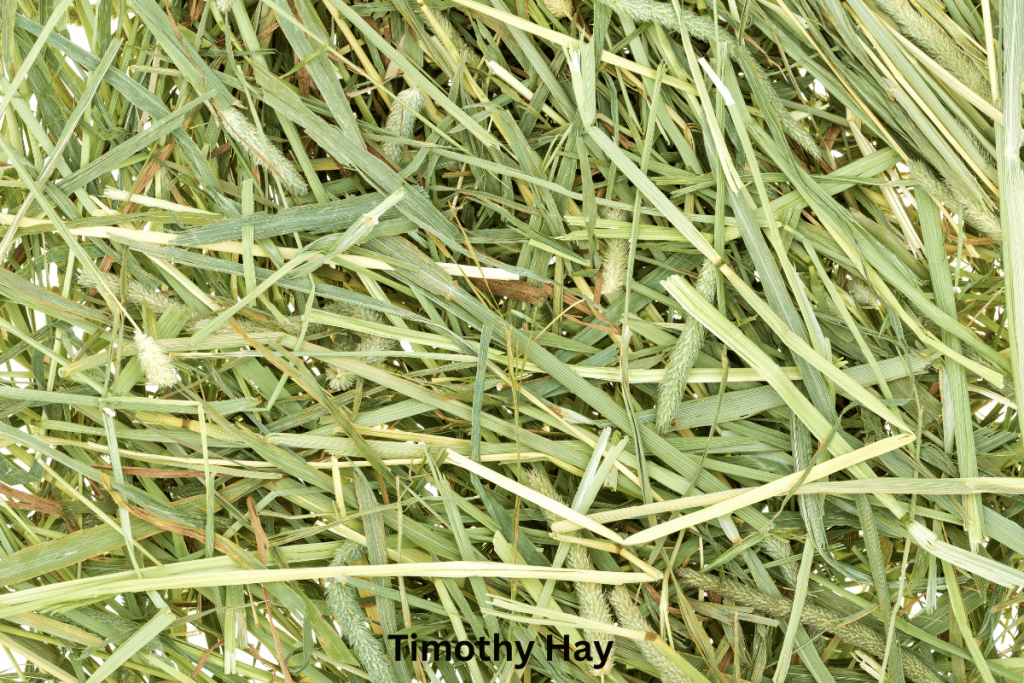
Alfalfa Hay
Loved for its rich protein and calcium content, making it ideal for lactating does and growing kids. However, its high protein levels may not suit all goats.
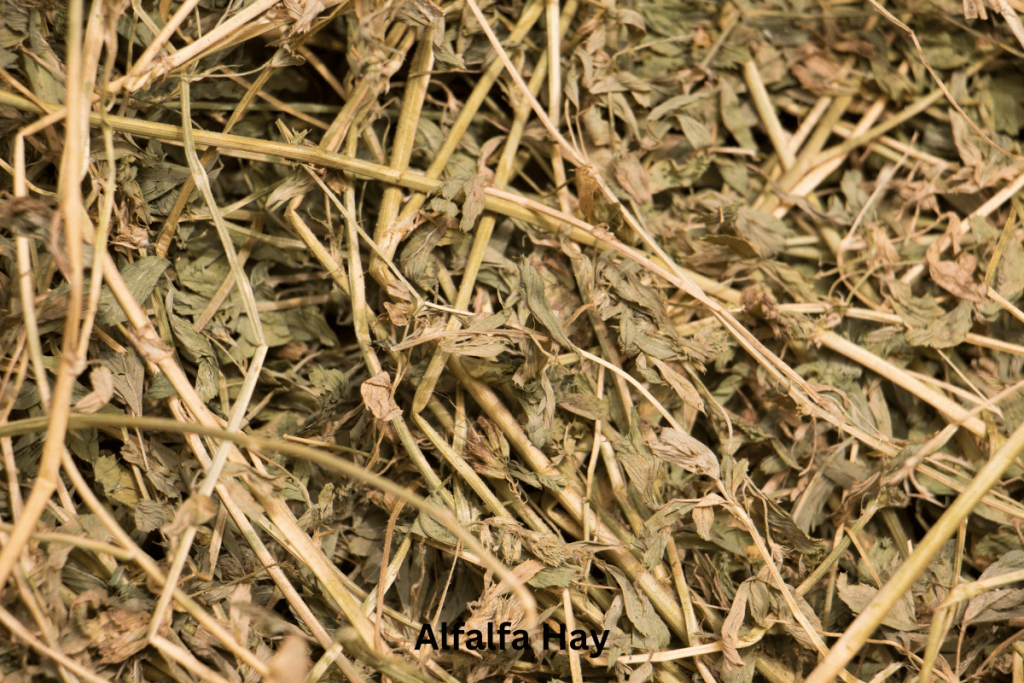
Orchard Grass
Valued for its soft texture and palatability, often preferred by picky eaters. Provides moderate protein and fiber levels.
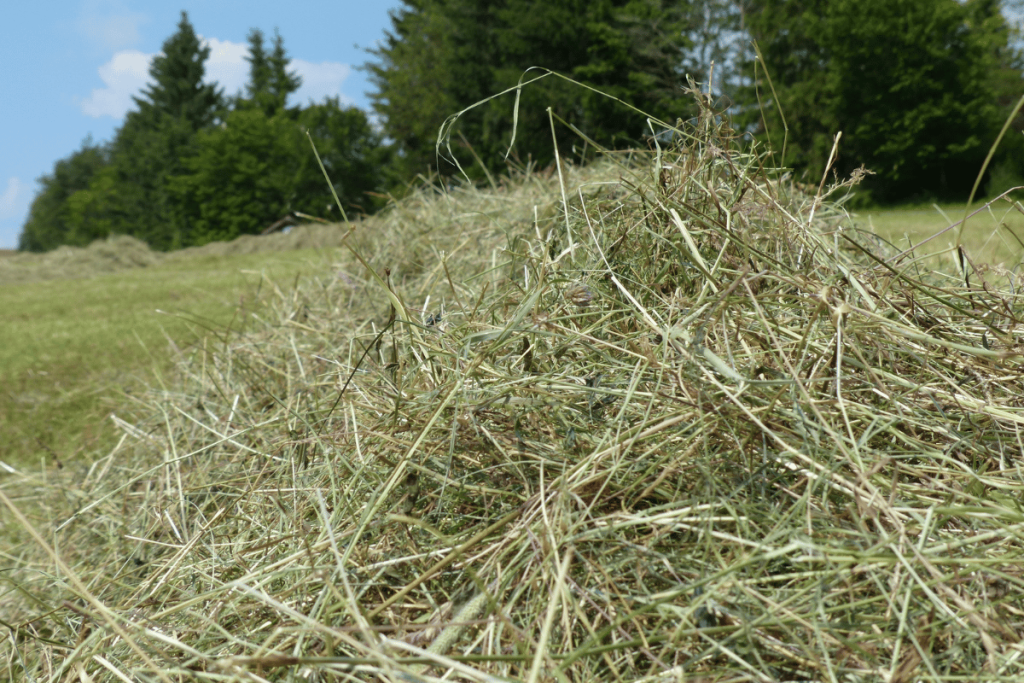
Legume Hay
Includes clover or vetch hay, offering high protein levels. Requires careful monitoring to prevent overconsumption and related health issues.
Bermuda Grass
Drought-tolerant and resilient, suitable for arid regions. Provides adequate fiber but may have lower protein content.
Cereal Grain Hay
Offers moderate protein and fiber levels, suitable for goats with average nutritional needs. Nutritional composition may vary based on factors like maturity at harvest.
Mixed Grass Hay
Combines various grass species, providing diverse nutrients and flavors. Offers balanced nutrition but content may vary depending on grass types.
Consider factors such as nutritional content, palatability, and availability when selecting hay for goats. Consulting with a veterinarian or nutritionist can help determine the most suitable hay type for your goats based on their dietary requirements and health status. Offering a variety of hay options ensures goats receive the balanced nutrition needed for optimal health.

Understanding Timothy Hay
Timothy hay, a staple in the diets of many goats, possesses distinct qualities that set it apart within the spectrum of available forages. Characterized by its fine, cylindrical stems and soft, leafy texture, timothy hay is a grass hay renowned for its balanced nutritional composition. Unlike alfalfa, which boasts higher protein content and is often considered more suitable for dairy goats due to its ability to support milk production, timothy hay offers a more moderate protein level that caters well to the dietary needs of various goat types, including both dairy and meat breeds. When compared to orchard grass and legume hay varieties, timothy hay holds its own in terms of fiber content, making it an excellent choice for promoting healthy digestion and preventing digestive issues in goats.
Nutrition of Timothy Hay
Nutritionally, timothy hay provides a well-rounded array of essential nutrients, including fiber, protein, and various vitamins and minerals crucial for goats’ overall health. Its moderate protein content supports muscle development and maintenance, while its fiber-rich composition aids in proper digestion, preventing issues like bloat and gastrointestinal discomfort. This balance of nutrients makes timothy hay suitable for a wide range of goats, from pregnant does needing extra nourishment to young kids requiring gentle, digestible forage.
The Practicality of Timothy Hay
In practical terms, timothy hay’s versatility shines through. While it may not boast the same protein levels as alfalfa, it serves as a valuable component in achieving a balanced diet for goats. Its lower protein content makes it an ideal choice for supplementing the diets of goats already receiving protein-rich feeds or concentrates, ensuring they maintain a healthy balance without exceeding their protein requirements. Additionally, timothy hay’s fibrous nature encourages natural foraging behaviors in goats, promoting dental health and mental stimulation. Overall, the nutritional value and versatility of timothy hay make it a cornerstone of many goat diets, providing essential sustenance for goats of all breeds and ages.
Benefits of Timothy Hay for Goats
Timothy hay offers a multitude of benefits that cater to the specific needs of goats across various life stages and purposes. One significant advantage lies in its provision of high-quality protein, albeit in more moderate quantities compared to alfalfa. This protein content is particularly crucial for dairy goats, where optimal nutrition is paramount to support milk production. By incorporating timothy hay into the diet of dairy goats, owners can ensure a steady supply of essential amino acids necessary for lactation, thus contributing to sustained milk production and overall dairy herd health.
Urinary Benefits
Another notable benefit of timothy hay is its role in preventing urinary calculi, a common concern in male goats. Unlike legume hays, which can contribute to the formation of urinary stones due to their high calcium content, timothy hay provides a balanced calcium-to-phosphorus ratio. This balance helps maintain urinary tract health, reducing the risk of calculi formation and associated health complications in male goats. By offering timothy hay as a primary forage option, goat owners can mitigate the risk of urinary tract issues and promote optimal urinary system function in their male goats.
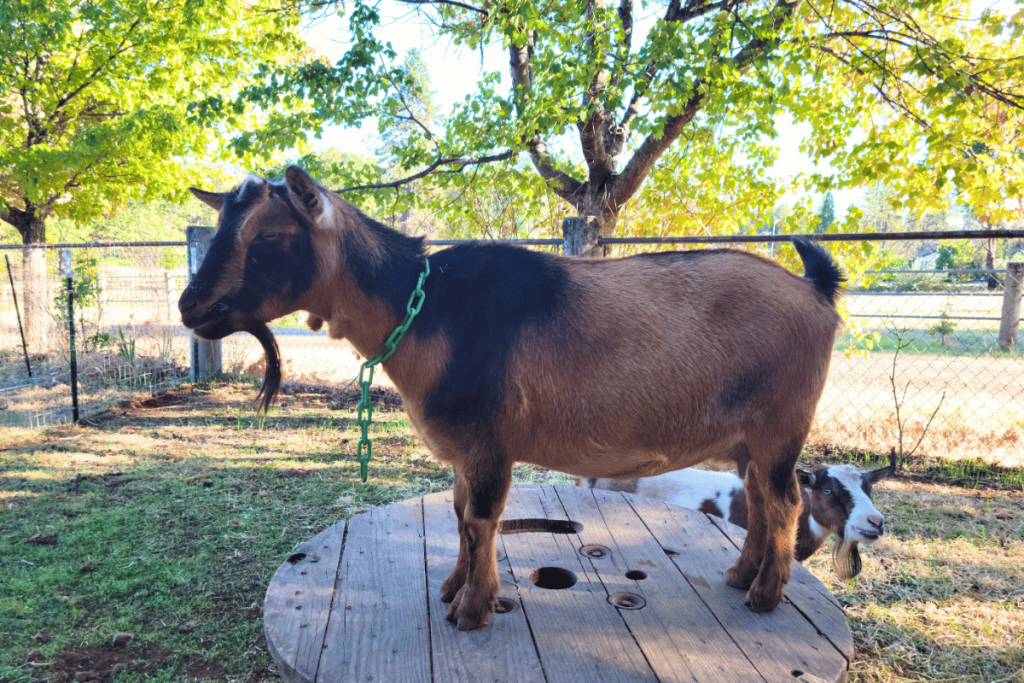
Pregnant Does and Young Kids
Furthermore, timothy hay’s balanced nutritional content renders it suitable for pregnant goats and young kids, where precise dietary requirements are paramount for optimal growth and development. Pregnant goats benefit from the fiber-rich nature of timothy hay, which aids in maintaining digestive health during gestation. The balanced protein content supports fetal development and ensures proper nutrient transfer to the growing offspring. Similarly, young kids thrive on the gentle, digestible nature of timothy hay, which provides essential nutrients without overwhelming their developing digestive systems. By incorporating timothy hay into the diets of pregnant goats and young kids, goat owners can support healthy pregnancies, robust offspring, and overall herd vitality.
Incorporating Timothy Hay into Goats’ Diets
The integration of timothy hay into goats’ diets is a strategic endeavor that requires careful consideration of various feeding approaches and supplementary options. One common practice is offering timothy hay free choice, allowing goats unrestricted access to hay throughout the day. This method aligns with goats’ natural browsing behaviors, enabling them to regulate their own intake and satisfy their nutritional needs as desired. Alternatively, some goat owners opt to incorporate timothy hay as part of a balanced diet alongside other feeds, such as grains or concentrates. By combining timothy hay with supplemental feeds, owners can customize their goats’ diets to meet specific nutritional requirements, particularly for goats with heightened energy or protein needs, such as lactating does or growing kids.
Supplementing
In addition to hay, supplementing goats’ diets with alfalfa pellets or alfalfa cubes can offer valuable nutritional benefits. Alfalfa, renowned for its high protein and calcium content, serves as an excellent complement to timothy hay, especially for goats requiring additional protein for milk production or calcium for skeletal health. Incorporating alfalfa pellets or cubes into goats’ diets provides a convenient means of augmenting protein and calcium intake without overreliance on fresh forage. This supplementation strategy proves especially beneficial during periods of increased nutritional demand, such as lactation or rapid growth phases.
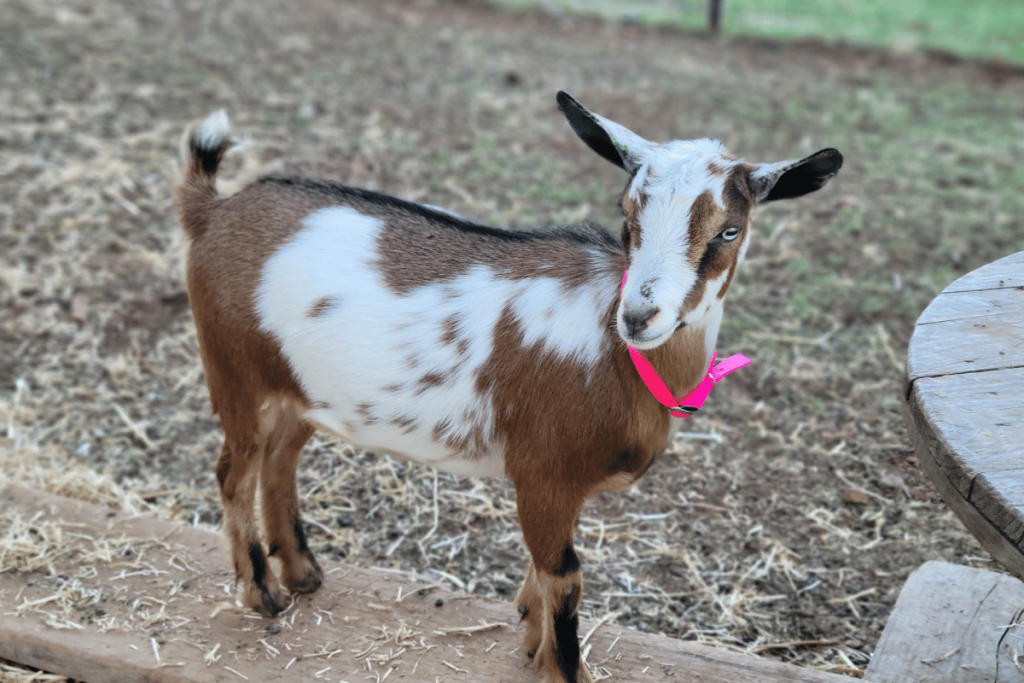
Adjust Feed Intake
When incorporating timothy hay into goats’ diets, it’s essential to adjust feed intake based on individual goats’ body weight and nutritional needs. Monitoring goats’ body condition and assessing their dietary requirements enables owners to tailor hay consumption accordingly, preventing undernourishment or excess weight gain. Additionally, factors such as age, reproductive status, and activity level should inform feeding practices, guiding adjustments in hay quantity to ensure optimal health and performance. By prioritizing individualized care and attention to goats’ nutritional needs, owners can effectively integrate timothy hay into their diets, promoting overall well-being and vitality among their herds.
Practical Considerations
Successfully incorporating timothy hay into goats’ diets involves addressing practical considerations related to sourcing, supplementation, and storage to ensure optimal nutritional intake and health maintenance.
Firstly, obtaining high-quality timothy hay is paramount for meeting goats’ dietary needs effectively. This entails sourcing hay from reputable feed stores or trusted suppliers known for their commitment to quality and consistency. Selecting hay that is fresh, free from mold or contaminants, and harvested at the peak of nutritional value ensures that goats receive the maximum benefits from their forage.
In addition to hay, providing loose minerals or mineral blocks alongside the forage is essential for addressing goats’ specific mineral requirements. While timothy hay offers a wealth of nutrients, it may not provide all essential minerals in sufficient quantities. Offering mineral supplements ensures that goats have access to vital nutrients like calcium, phosphorus, and trace minerals necessary for overall health, reproduction, and performance.
Furthermore, proper storage of hay is crucial for preserving its nutritional value and preventing mold contamination. Storing hay in a dry, well-ventilated area away from moisture and direct sunlight helps maintain its freshness and palatability. Regularly inspecting hay bales for signs of mold or spoilage and promptly removing any affected portions minimizes the risk of digestive issues and ensures that goats receive high-quality forage.
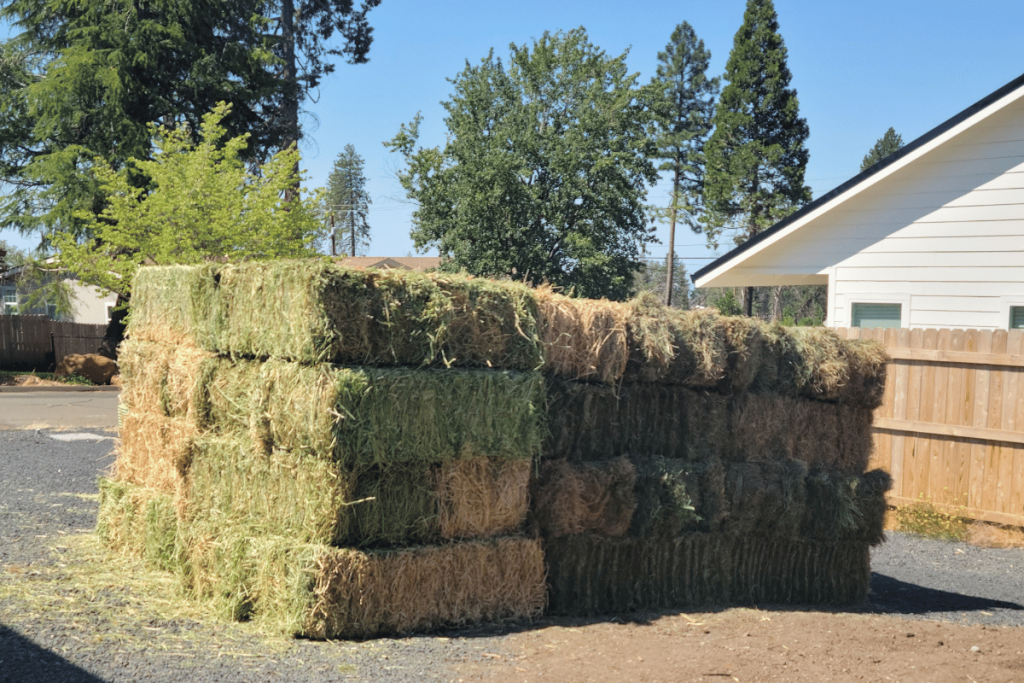
Health Considerations
Ensuring the well-being of goats extends beyond merely providing them with nutritious feed; it also involves addressing potential health concerns associated with their dietary intake.
One significant consideration is the risk of respiratory problems stemming from dusty or moldy hay. Inhalation of dust particles or mold spores present in hay can irritate goats’ respiratory systems, leading to conditions like respiratory infections or allergies. To mitigate this risk, it’s crucial to carefully inspect hay for signs of dust or mold contamination before feeding it to goats. Opting for high-quality, clean hay and storing it in well-ventilated areas can help minimize dust accumulation and reduce the likelihood of respiratory issues among goats.
Furthermore, preventing digestive issues is paramount for maintaining goats’ overall health and well-being. Offering hay in a natural pellet form or with added ingredients like baking soda can aid in digestion and alleviate gastrointestinal discomfort. Pelleted hay provides goats with a more concentrated source of fiber, making it easier to digest, especially for animals with sensitive digestive systems. Additionally, baking soda acts as a natural antacid, helping to regulate stomach pH and prevent conditions like acidosis or bloat. By incorporating these strategies into goats’ diets, owners can promote optimal digestive health and minimize the risk of gastrointestinal disturbances.
Lastly, monitoring for nutritional imbalances, such as zinc deficiency, is essential for safeguarding goats’ health. Zinc plays a vital role in various physiological processes, including immune function, hoof health, and reproductive performance. Insufficient zinc intake can lead to deficiencies, manifesting as symptoms like poor coat quality, hoof abnormalities, or compromised immune function. By regularly assessing goats’ diets and ensuring adequate zinc supplementation through feed or mineral supplements, owners can prevent deficiencies and support overall health and vitality in their herds.
Specific Needs of Different Goat Types
Recognizing the diverse requirements of various goat types is essential for tailoring their diets to meet specific nutritional needs and support optimal health outcomes.
Dairy Goats
Dairy goats, for instance, have distinct dietary requirements due to the demands of milk production. High-quality timothy hay serves as an excellent forage choice for dairy goats, providing essential fiber and nutrients while maintaining a balanced diet. Additionally, supplementing their diet with alfalfa pellets or cubes can offer additional protein and calcium needed to sustain milk production and support overall lactation performance.
Meat Goats
In contrast, meat goats may have different nutritional needs, particularly if they are raised for meat production rather than milk. While timothy hay remains a valuable component of their diet, meat goats may benefit from a higher protein content, achieved through supplemental feeds or grazing on legume-rich pastures.
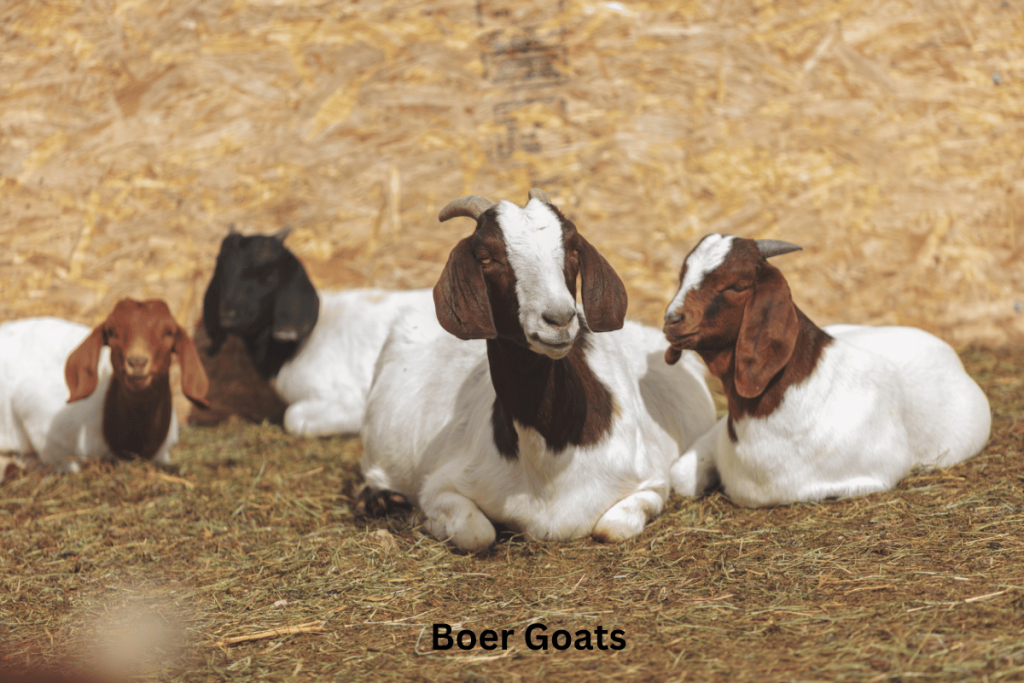
Pregnant Does
Pregnant does have unique dietary requirements, especially during late pregnancy when fetal development is at its peak. Increasing hay intake during this period supports the nutritional demands of pregnancy and prepares does for lactation. Timothy hay provides the necessary fiber and nutrients to support healthy pregnancies, while mineral supplementation ensures adequate levels of essential minerals like calcium and phosphorus for fetal development and maternal health.
Cold Winter Months
Similarly, adjusting hay intake during the winter months is crucial for supporting pregnant does and lactating goats. As energy demands increase to maintain body temperature and support milk production, goats may require additional hay to meet their nutritional needs. Ensuring access to high-quality timothy hay throughout the winter helps sustain energy levels and promotes overall health and vitality during this challenging season.
Conclusion
So, can goats eat timothy hay? The role of nutrition stands as a cornerstone for fostering health, vitality, and productivity among our caprine companions. Throughout this exploration of the benefits of incorporating timothy hay into goats’ diets, we’ve delved into the nuanced considerations that underpin effective dietary management.
Timothy hay, with its balanced nutritional profile and versatility, emerges as a steadfast ally in the pursuit of goat wellness. Whether offered free choice or as part of a balanced diet alongside supplementary feeds, timothy hay provides essential fiber, protein, and minerals that support goats’ digestive health, reproductive performance, and overall vitality.
As stewards of goat health and well-being, it falls upon us to heed the specific needs of our herds and adapt our feeding practices accordingly. By embracing the principles outlined herein and remaining vigilant in our commitment to providing wholesome, nutrient-rich forage, we can ensure that our goats thrive and flourish, embodying the epitome of health and resilience.
In closing, let us continue to prioritize the nutritional needs of our goats, recognizing that in the provision of optimal nourishment lies the foundation for a thriving and prosperous herd.
Check here for my favorite resources.
Some of these links are affiliate links where I earn a small commission at no extra cost to you.



